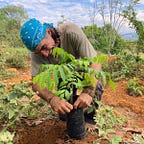Walking the Path of Regeneration
Our family arrived in the town of Barichara in Colombia’s northern Andes Mountains with the intention of learning how to live a regenerative life while raising our three-year-old daughter. We know that the Earth is in overshoot-and-collapse. We are deeply aware of the challenges humanity must navigate in the coming century. And we want to be part of the healing that our planet so desperately needs.
We were welcomed by a host family — Felipe and Alejandra along with their three young kids — who were about to begin a summer school for children based on the principles of deep ecology. Our daughter Elise joined the boisterous group of twelve kids ranging in age from three to seven on a walking journey around the ecological corridor surrounding this town with its population of 7000 people.
Jessica (my wife) created a list of things to learn while we are here: how to source all our food locally, how to remove fossil fuels from our lives, how to embody the daily ethics of an indigenous tradition, how to place our hands in the soil and regenerate a piece of Earth. Importantly, this is something we are doing as a whole family. We want to learn how to be parents and have healthy livelihoods while contributing positively to the healing of landscapes.
We started to learn alongside the children about how 30 years of deforestation have caused all of the rivers to run dry. A food forest was initiated ten years ago as a community project on a 6 hectare piece of land called Bioparque Móncora. Rebuilding of soils and getting the waters to flow again is among their top priorities in this sun-parched region.
I set up a crowdfunding campaign to help raise funds for a water retention system that will become a “teaching tool” for children to practice landscape regeneration in the community food forest. We began to map out the drainage basins for the fifteen or so tributaries that used to fill up the Barichara River that is now polluted and nearly dead.
We have only been here a month and already we feel like part of the community. Gathering several times a week with other kids makes it a lot easier to become friends with their parents. We have made lots of friends and are feeling right at home.
Our goals of learning how to live regeneratively remain largely elusive… this deep of a life transformation takes time to manifest, after all.
But we are doing it. And it feels good.
This is a story unfolding. We don’t know what is going to happen next. Yet we somehow feel deeply empowered to be part of something that is (a) truly meaningful and worthwhile; and also (b) addresses systemic challenges at the appropriate scales that might eventually make a difference.
No, we haven’t gotten fully off fossil fuels. We get around on bikes and haven’t owned a car in more than a decade. But we flew here from the US on airplanes and took buses up into the mountains from Bogota. But we have gotten over the powerlessness of lazily continuing our existence as if the world was not in crisis. And we really feel like we can make a meaningful difference.
In the last year, I have given four workshops titled Managing Planetary Collapse that have been transformative for Jessica and me as we gathered together with different cohorts of people who share our desire to regenerate the Earth. I have created a number of proposals, sketches, and slide decks about how to design for large-scale regeneration (see here and here for two examples).
But it wasn’t until we walked in the forest with a group of children at play that we began to actually DO something about it. And this small step may prove to be all the difference in our lives.
We invite you to walk this path of regeneration alongside us. It is worth it, I can assure you.
Onward, fellow humans.
Joe Brewer is the executive director of the Center for Applied Cultural Evolution. Get involved by signing up for our newsletter and consider making a donation to support our work.
